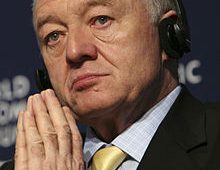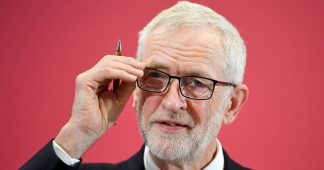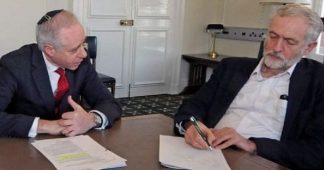What it comes down to is that, for the first time, Labour has a leadership which, in addition to being pro-working class and pro-poor, is solidly anti-imperialist, anti-war and anti-racist.
By Carlos Martinez
31 October 2019
A left Labour government, led by Jeremy Corbyn, Diane Abbott and John McDonnell, would constitute an unprecedented opportunity for the anti-war and anti-imperialist movements. It would put our ideas at the heart of government, and in so doing could start to turn Britain into a force for peace and justice in the world.
Furthermore, it would provide inspiration to progressive and working-class movements elsewhere in Europe and in North America, potentially setting off a snowball effect contributing to the construction of a more peaceful, multipolar world.
What it comes down to is that, for the first time, Labour has a leadership which, in addition to being pro-working class and pro-poor, is solidly anti-imperialist, anti-war and anti-racist. And what’s more, these positions are backed up by the bulk of the membership.
The present leadership team has a well-known record of opposing imperialist wars. Corbyn, Abbott and McDonnell are among the very small handful of MPs that loudly stood up against war in Iraq, in Afghanistan, in Libya and in Syria. Jeremy Corbyn has been a prominent member – Chair for several years – of the Stop the War Coalition since its inception in 2001. He’s been involved with the Palestine Solidarity Campaign for decades. All three of them have supported progressive movements and governments in Latin America – in Venezuela, Cuba, Bolivia, Brazil, Ecuador and Nicaragua. They’re longstanding supporters of Irish unity and self-determination – a key anti-colonial litmus test for the British left.
As everyone knows, Corbyn was an energetic campaigner against apartheid in South Africa. The three of them are lifelong campaigners against racism. They oppose Nato, they oppose nuclear weapons.
What might this mean at a practical level?
Perhaps the simplest way to think about the practical implications of having veterans of the anti-war movement at the highest levels of government is to consider whether, when Britain was deciding whether to go to war against Iraq in 2003, it would have been better if the final decision lay with Jeremy Corbyn rather than Tony Blair.
This isn’t an entirely abstract thought. The Trump regime is ramping up the pressure against Iran at the moment. Whereas an Atlanticist hard-Brexiteering Tory government would fall in line without hesitation, it’s clear that a left Labour government would do everything it could to defuse tensions, to avoid war, to oppose sanctions, and to bring all parties back to the Joint Comprehensive Plan of Action.
It would work to reduce tensions with Russia. It would oppose regime change efforts in Venezuela. It would be much less likely to take aggressive action against Syria or Korea. It would pursue fair and balanced relationships with Africa, Asia, Latin America.
Environmental justice
It might not seem relevant, but it’s worth mentioning that the Labour Party also has excellent policies in relation to the environment, and the policies announced at the recent conference are among the most advanced in the world.
This is actually connected with issues of anti-imperialism, in that the climate crisis is something that’s been caused almost entirely by western imperialist countries, that have gone round the world finding, extracting and burning fossil fuels that they’ve used to power their own economic development.
For one thing, those natural resources – typically fossil fuels – are often secured by means of war or political destabilization. It’s hardly a coincidence that Iraq, Libya and Venezuela have some of the largest known petroleum reserves on the planet.
But another aspect of the climate crisis is that the areas of the world that are set to suffer most, indeed that are already suffering, from the climate crisis are the countries of the Global South – countries that have had practically zero role in creating the crisis in the first place. It’s estimated that people in the least-developed countries are 80 times more likely to be subjected to a catastrophic climate event than people in OECD countries.
So doing everything within our power to prevent climate breakdown is a debt we owe to the world, and it’s extremely positive that Labour has adopted the Green New Deal. In his speech at the party conference this year, along with a policy of making green technologies available cheap or free to the countries of the Global South – specifically referred to by John McDonnell in his speech to party conference this year as a form of reparations. It’s certainly hard to imagine the Tories or Lib Dems offering anything along those lines.
Not business as usual
All this is very much not business as usual for the Labour Party. The dominant ideology in Labour has always been what Lenin called ‘social chauvinism’ or ‘social imperialism’: pursuing reforms and improvements for workers at home whilst accepting and supporting imperialist domination abroad. Lenin described the basic economics of this as follows: “The capitalists can devote a part of their profits (from exploiting the world) to bribe their own workers, to create something like an alliance between the workers of the given nation and their capitalists against the other countries.”
In assessing Labour’s historical role, this analysis resonates. Labour governments have won some important gains on behalf of ordinary people in Britain, but they’ve also tended to side with the British ruling class when it comes to its militarist, imperialist role in the world.
We sometimes talk about the ‘Spirit of 45’, the Clement Attlee government of 1945 to 1951, as being the pinnacle of achievement for Labour in power. And certainly there were some hugely important steps forward in those years – in particular, the building of millions of council homes and the establishment of the NHS, which is something we should all be grateful for (and passionately defend).
But alongside all this, the Attlee government also co-founded Nato, developed nuclear weapons to threaten the Soviet Union, drowned the Greek revolution in blood, callously and cynically presided over the carnage that accompanied the partition of the South Asian subcontinent, openly pushed a racist policy to expel the Arab population from Palestine, waged a vicious war against the independence movement in Malaya, and participated in the Korean War, that forgotten ‘peacetime’ episode the cost the lives of around 3 million Korean and Chinese people. Nor did this government show any inclination to stand up against racism; indeed Attlee looked into the possibility of having the Empire Windrush diverted to East Africa, describing the voyage as an “incursion”.
Roots of Labour imperialism
Why have the Labour Party and British labour movement tended to side with imperialism? We can conceive of this trend in terms of a softly-softly approach to improving the lives of British workers.
Really it’s a form of class collaboration. We don’t want to scare the ruling class, we don’t want to affect anyone’s profits, we don’t want to dismantle capitalism, we’re happy for the rich to be ‘wealth creators’ and ‘job creators’, but we do want a few extras for the people we represent: the British working class, or at least the better-off sections of the British working class.
That means going along with imperialism, with colonialism, with war, with the military-industrial complex, so there’s more profit in the system and therefore more that can be shared out.
This comes down to basic economics. Capitalism doesn’t wage war and engage in domination for the fun of it, or because of some strange psychopathology connecting wealth and violence.
The quest for profits demands growth. Successful economies expand their operations, they capture foreign markets, they find more sources of raw materials, they find more sources of cheap labor.
Slavery, colonialism, the genocide of indigenous peoples in the Americas and Australasia, policy famines from Ireland to India, the Opium Wars, can all be explained in terms of capital’s need to reproduce itself, to constantly grow bigger. And a lot of British workers have benefitted to some degree from all of that.
In more recent times, imperialism has tended to manifest itself primarily through the military-industrial complex, whereby capitalist states use war (and the production of weapons of death and destruction) in order to spend their way out of an economic crisis. In the midst of a crisis of overproduction, capitalism requires something to invest in, and what better than war?
What a boost the Iraq War has been to arms manufacturers, military service providers, contracting companies – to Bechtel, to McDonnell Douglas, to Raytheon. Their shareholders are living well today.
So when Labour has sided with imperialism, it has been following a path of class collaboration. Thankfully, there is another path towards a better life for ordinary people, and that is class struggle, where we demand better conditions, better pay, better jobs, education, healthcare, housing, more democracy, more involvement in the running of our own lives.
We don’t really care about capitalist profit. We’ll happily nationalize companies and whole industries if they can’t be run profitably and at the same time provide a decent standard of living to their workers.
And what’s more, we don’t sell out workers in other countries. Particularly in a world of globalized production, these are our allies. We don’t fall for divide-and-rule tactics, but rather we close ranks with national minority communities at home. The more unity we have, the stronger we are, the more effectively we can wage class struggle against capital.
This is the fundamental strategic divide. Class collaboration versus class struggle. And that’s the real significance of having a Labour leadership that opposes war, imperialism and racism, that opposes the military-industrial complex, that opposes nuclear weapons and NATO.
And it’s important to remember that these policies and ideas aren’t limited to the top leadership of the Labour Party. Labour’s membership has increased over 2.5-fold since 2015. It is the largest political party in Western Europe. And anti-imperialist, anti-war, anti-racist policies are popular at the grassroots level.
Even many of the trade unions are starting to shift in the direction of class struggle, and that means shifting in a direction of internationalism, breaking out from the ideological umbrella of the ruling class and taking up a position of solidarity with the workers and oppressed peoples of the world.
So there’s some convergence between the leadership and the membership of the Labour Party in relation to anti-war and anti-imperialist ideas.
Why’s this shift happening now?
Part of the reason for the shift described above is that the ‘postwar consensus’ has broken down under the weight of the neoliberal onslaught since the late 1970s. The balance of power has moved towards the ruling class, which has has been pursuing free-market fundamentalist economic policies that have created an ever-wider gap between rich and poor.
It’s not entirely coincidental that this economic offensive gained momentum in the same period that the Soviet Union and the European people’s democracies were starting to stagnate. Workers in the capitalist countries had won concessions such as free healthcare, social housing and decent pay; they fought for these things and we rightly celebrate that fight, but one of the reasons the ruling classes gave way on some of these issues was the looming threat of the example provided by the socialist world.
The Soviet Union and European people’s democracies, for all their contradictions and flaws, had comprehensive social insurance systems, full employment and high quality of education. They were able to eradicate malnutrition and homelessness, and in so doing solve certain problems that even the most advanced capitalist society had never – and still hasn’t to this day – been able to solve. So this dynamic affected the balance of forces within the capitalist society.
In the period of decline and collapse of European socialism, the owners of capital became more confident and aggressive in pursuit of their own interests.
The share of GDP that goes to the working class is now lower than it was in the 1930s. The rich get richer every year, but conditions for the working class are getting worse all the time. In Britain, life expectancy is actually starting to fall. Austerity, unemployment and underemployment have put millions of people into poverty, missing meals, living in unhygienic and inadequate housing. There are currently around a million people in this country working zero-hour contracts. They literally don’t know, week to week, if they’ll be able to pay their rent or put food on the table.
To a considerable degree, moving from a position of class collaboration towards a position of class struggle reflects the fact that, increasingly, class collaboration isn’t working. If the unions are getting more militant, if hundreds of thousands of people are mobilized to get involved with Labour and to support Corbyn’s anti-war platform, this reflects changing economic and political realities.
There’s a lot to play for. The anti-war and anti-imperialist movements in Britain are closer to power than they’ve ever been. Of course, there are problems, there are contradictions, there are weaknesses. Labour’s MPs are still largely the same as they were before Corbyn became a leader. Some of these MPs are old-fashioned social democrats who want a slightly bigger slice of the pie for workers; actually those are the better ones. Far too many Labour MPs are Blairite neoliberals who don’t identify with workers at all. We face their continued hostility, along with that of the billionaire media.
Nonetheless, we’re in a very promising situation and there is a political trajectory within Labour that we need to defend and consolidate. Hopefully, this dichotomy of class collaboration versus class struggle is a helpful way to conceptualize what’s going on in the Labour Party and the wider progressive movement.
* Carlos Martinez is a political activist, analyst and musician from London. He runs the political history blog “Invent the Future” and produces hip-hop under the name Agent of Change.
Published at https://www.telesurenglish.net/opinion/A-Left-Labour-Govt-Would-Weaken-Imperialism-Work-for-Peace-20191031-0002.html











